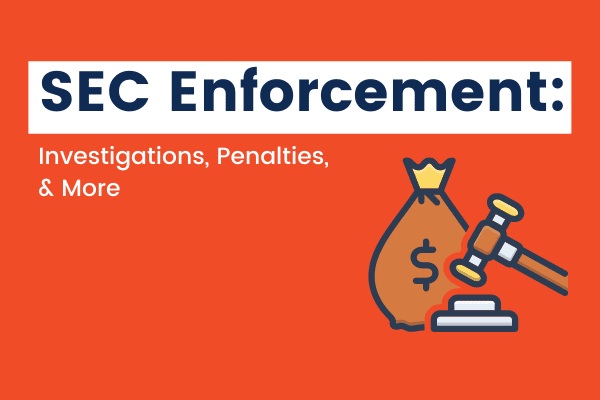In 2021, the SEC Enforcement Division handed out $3.9 billion in penalties to companies and individuals found guilty of SEC violations. Most SEC Investigations don’t result in prison time, but they can place a huge dent in your bank account if you’re not careful.
One common target of SEC enforcement is the sale of unregistered securities, which is a thorny issue in the age of blockchain. Many new crypto projects are launching which could become the target of SEC penalties and litigation.
Read on to learn what’s at risk for companies or individuals that violate SEC regulations.
SEC Enforcement: Laying Down the Law
The SEC Enforcement Division is one of 5 divisions that make up the SEC. It’s responsible for conducting SEC investigations and issuing penalties to individuals or organizations who violate SEC laws.
SEC investigations are civil, not criminal, meaning the penalties are financial and administrative—but these SEC penalties can still destroy an offender’s business or even personal life.
Additionally, while the SEC cannot send individuals to prison, it can refer potential criminal cases to the Department of Justice. If the Department of Justice decides to pursue a case, the alleged offender(s) could risk prison time.
How SEC Investigations Work
Most SEC investigations result from complaints or tips from the public about potential misconduct. An SEC investigation aims to determine if there has been a clear violation of SEC rules and regulations.
The most common SEC violations that can lead to an SEC investigation include:
- Insider trading
- Exclusion of important information about securities (for example, misleading investors about the value of a publicly-traded company)
- Selling unregistered securities—an area of increasing concern for many cryptocurrency, NFT, and blockchain projects
- Theft of funds for personal use
The SEC Enforcement Division decides which cases to investigate based on:
- The number of victims harmed by the misconduct
- The potential or actual harm the misconduct caused investors
- Whether immediate action is needed to protect investors
- If the liquidity of the securities market is threatened
- Whether an individual with a prior history of misconduct is involved
SEC Enforcement: Subpoenas
If the SEC suspects an individual or company of violating SEC law, investigations typically begin with an informal letter requesting certain documentation, or requesting a meeting with the SEC. They may reach out to an alleged offender’s employees, investors, or personal contacts.
An investigation may also begin with subpoena requiring the recipient to provide requested documents (such as the business’s financial records) or to testify before the SEC. A subpoena will not disclose the recipient’s role in the investigation.
If you receive a letter or subpoena, the SEC Enforcement Division is confirming they have reason to suspect a violation of SEC law. It’s crucial to be proactive if you receive an SEC subpoena; failure to respond could result in contempt of court charges. We highly recommend retaining a lawyer before speaking with the SEC or providing any information.
In a case of selling unregistered securities, the SEC investigates:
- Whether the securities were registered with the SEC and the Financial Industry Regulatory Authority (FINRA)
- If the securities have been properly registered with the required state agencies
- Verification of Broker/Dealer Licenses
- If there has been a history of complaints reported by investors
SEC Penalties: Civil & Administrative Actions
Once the Enforcement Division has gathered enough evidence, the SEC decides how to proceed, through civil or administrative actions. The processes vary, but either route can potentially result in:
- Severe financial penalties: penalties can easily reach tens of thousands of dollars per violation.
- Disgorgement, aka the repayment of ill-gotten funds
Suspension from serving as director or officer of a company - Being barred from associating with the securities industry (i.e. anything involving stocks or other securities)
How to Protect Yourself Against SEC Enforcement
So, you’ve just been subpoenaed by the SEC. Now is not the time to procrastinate! Here are the next steps you should take:
1. Hire an experienced attorney: It’s critical that you hire an attorney who’s experienced in handling SEC cases and familiar with the federal courts’ processes.
2. Review the subpoena: Make sure you carefully review important dates, times, and deadlines.
3. Gather documentation: Begin to prepare the requested documents outlined in the subpoena right away to prevent requests from becoming overwhelming.
4. Loose lips sink ships: Privileged information should remain between you and your attorney. Speaking about the facts of an ongoing investigation either in casual conversation or on social media could lead to additional penalties.
5. Audit yourself: An internal audit can help you and your attorney prepare the proper response to any evidence found during the SEC Investigation.
Delaying the process only digs a deeper hole. If you find yourself the subject of an SEC investigation, contact the experienced attorneys at Gordon Law Group for help immediately!
We can also help you avoid SEC enforcement actions through a comprehensive legal review. Reach out for more information.




